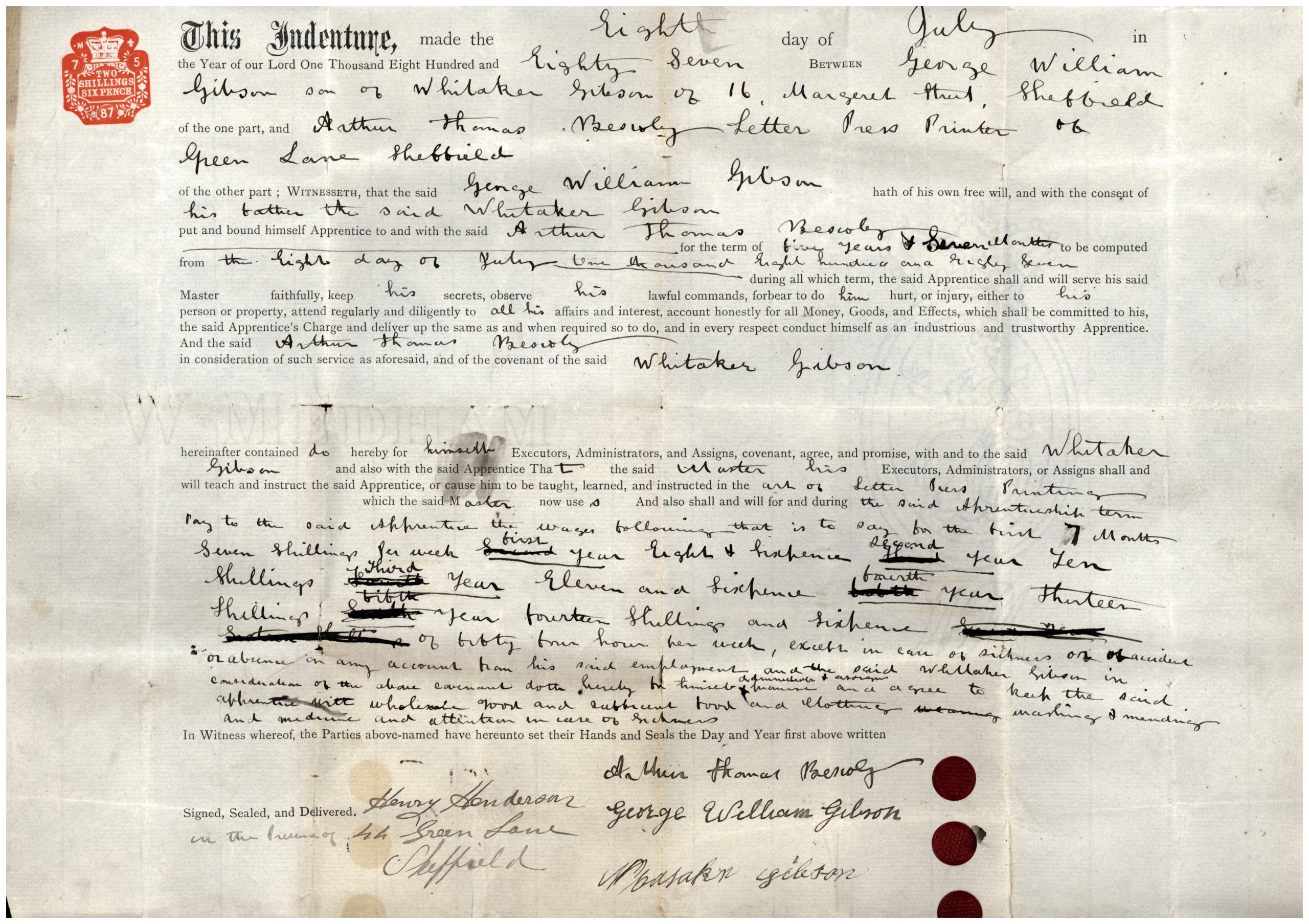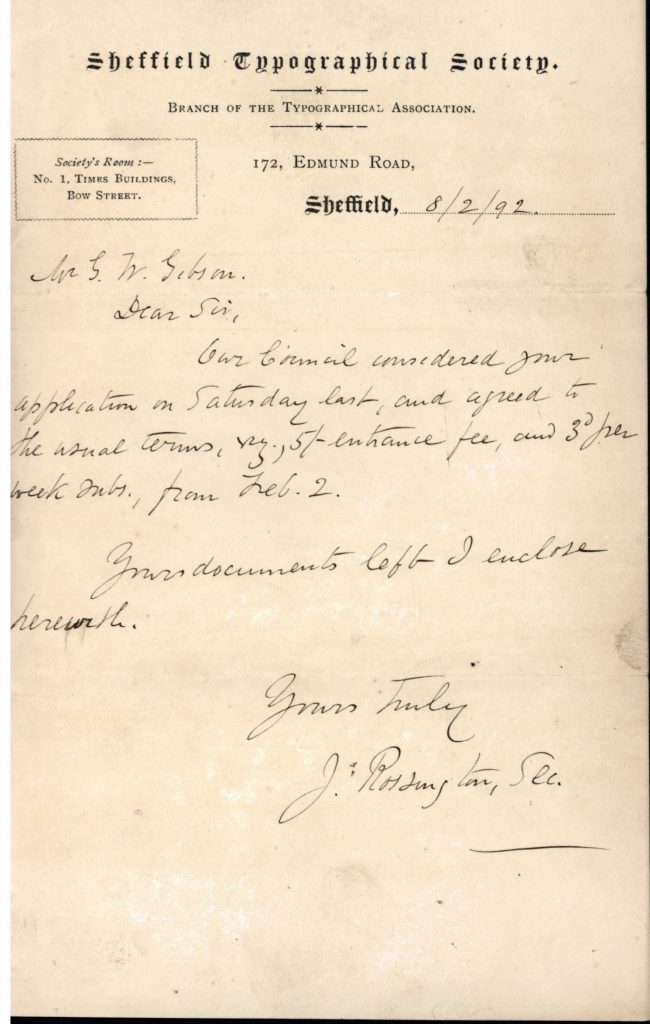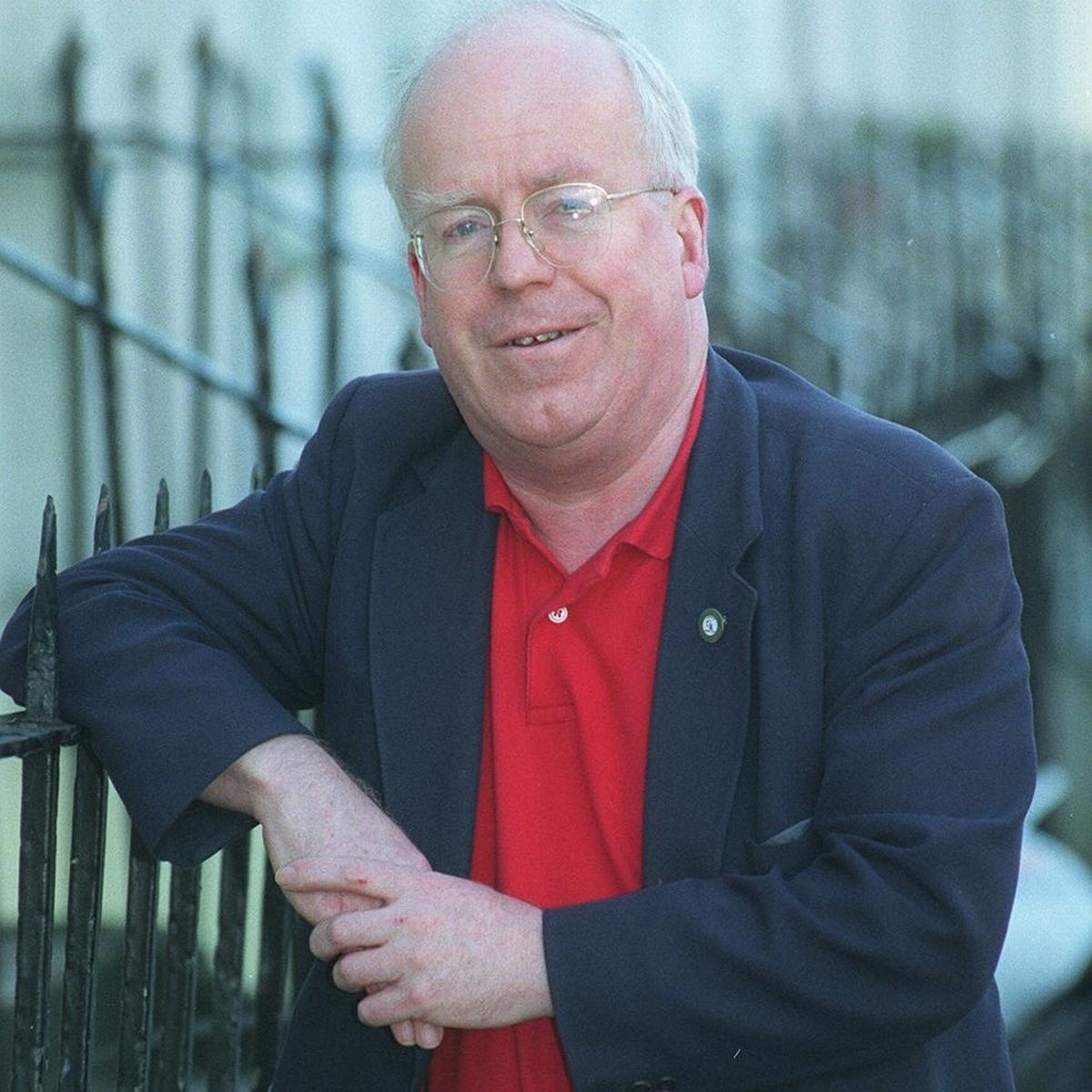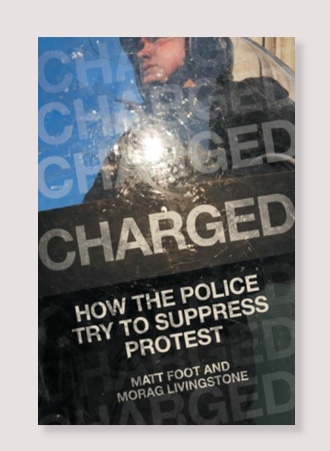-
Recent Posts
- USA Unions: Service Employees Union Returns To AFL-CIO
- Speech by Hugh Lanning of Labour & Palestine on UN Day Of Solidarity
- Shifting Gear? The EU’s Tariffs On Chinese Battery Electric Vehicles
- Times: Business Chief’s “Being Held To Ransom”
- TUC: Scunthorpe Steelworks – Time To Act To Future-Proof Jobs
Recent Comments
- ron senchak on George Jerrom: Former GPMU National Officer
- Alan Royston on George Jerrom: Former GPMU National Officer
- Alan Royston on WAPPING – ‘THE WORKERS STORY’
- Prof Prem raj Pushpakaran on Blogs
- Martin Corrick on The Maverick Advisers Running Britain – Brilliant Article By Harry Lambert
Recently Updated Pages
- Recommended Websites on 2nd February, 2020
- Video & Audio on 2nd February, 2020
- Archive on 2nd February, 2020
Archives
Categories
Giant German Union To Demand 32 Hour Working Week
 The German trade union IG Metall (IGM), Europe’s largest trade union, will be demanding an 4 day, 32 working week without loss of pay ahead of the next collective bargaining round for the steel, metalworking and electrical industries due to take place in November this year.
The German trade union IG Metall (IGM), Europe’s largest trade union, will be demanding an 4 day, 32 working week without loss of pay ahead of the next collective bargaining round for the steel, metalworking and electrical industries due to take place in November this year.
“We want to achieve real relief for workers without having them earn less because of it,” said IGM North Rhine-Westphalia’s Chief Negotiator Knut Giesler ahead of collective bargaining negotiations in the states of North Rhine-Westphalia, Lower Saxony, Hesse and Bremen.
Pattern bargaining in the metalworking, steel and electrical industries commences with negotiations in North Rhine-Westphalia, which knocks onto other German regions establishing a new nationwide agreement that applies to the whole of the German metalworking and electrical industries and is closely watched by Government’s and politicians throughout Europe.
Giesler argued that shorter hours will greatly improve workers’ health and quality of life while at the same time making the industry more attractive to younger workers and combatting expected job losses in in a shift towards the green transition.
Speaking to the Westdeutsche Allgemeine newspaper Giesler outlined to the plan for the introduction of a four-day, 32-hour work week without loss of pay. This would be a reduction from the current 35-hour week. The change would likely require a phase-in period, said Giesler.
The president of IG Metal Jorg Hofmann added that the union had already implemented the 4-day week as a collectively agreed option for temporarily reducing working hours or as an instrument for safeguarding employment for many employees. This is a next step toward an attractive industrial working world that allows life and work to be combined well.
Profits in the German manufacturing sector are booming in foundries, engineering, autos, electronics, and defence. Profit margins for Mercedes and BMW, and electronics firms Siemens and Bosch were all estimated between 12-15% in 2022, with Volkswagen looking at an 8% increase.
Rheinmetall, ThyssenKrupp, KMW and MBDA all saw increased revenues in the billions as orders soared in the face of Russia’s invasion of Ukraine.
Posted in Trade Unions
Leave a comment
Review of A Glorious History – The History Of The Print & Papermkaing Unions Of The UK and Ireland.
 By journalist and broadcaster Nicholas Jones.
By journalist and broadcaster Nicholas Jones.
Probably no other industry can match printing and publishing for the strength and intensity of the collective action which has been exercised over several centuries as workers have had to organise themselves to adjust to repeated changes in industrial and employment practices.
A Glorious History provides a page-turning kaleidoscope of the countless guilds, societies, associations and trade unions that came and went across the country as printers, bookbinders and assorted paper makers struggled to protect their pay and conditions.
Exploitation was commonplace in the early years. Some printing works were manned largely by boys and apprentices. Cheap labour led to widespread abuse and ill health.
One statistic from the book’s introduction leapt from the page:
“Two decades into the twentieth century, conditions were still so bad in printing establishments that the death rate from tuberculosis was 1:3, whereas the national rate was 1:7.”
Here was a vivid reminder of a hidden family secret: my grandfather George Gibson, who at the age of 12 started work for a printer in Sheffield, developed a lung condition that by his mid-twenties had advanced to become tuberculosis and he was sent for treatment to a sanatorium in the Isle of Wight.
Such was the public fear and suspicion around tuberculosis – and the handicap this presented to future employment – that after a near-death experience no further mention was made of his illness outside the family.
Echoes of my grandfather’s teenage years in the printing industry appear on page after page of A Glorious History with its vivid illustrations of the artefacts and memorabilia of the time: notices of indentures; early guild and trade union badges and cards; union banners; posters for public meetings and strikes – a compendium of images reflecting struggles that spanned two and a half centuries.
Laid out in the book is the timeline of the haphazard but clearly determined way in which workers across a myriad of kindred trades organised themselves to fight for shorter hours and better pay.
Grandfather Gibson trained as a hand compositor and the book’s authors – Tony Burke and Ann Field — capture the transformation that took place when hand composition was overtaken by the introduction of linotype machines.
A generation of highly paid craftsmen were reduced to penury. Gibson, like so many of his compatriots, went cross country, from job to job, seeking work, for ever reducing rates of pay and worsening conditions.
On leaving school, he started on 4 shillings a week, plus a penny an hour overtime, working from 8am to 7pm. Over the next three years he had jobs at various printing establishments in the city, the last being at the offices of the Sheffield Evening News which collapsed within a year of its launch.
In 1887, at the age of 16, he became a bound apprentice at the Sheffield print works of A T Bescoby on 7 shillings a week, rising by 1 shilling and sixpence a year until he was 21.
Replicas of parchment indentures just like Gibson’s, written in pen and ink, complete with red seals and numerous signatures, are reproduced in A Glorious History.
Again, his experience as an apprentice, which he wrote up in a diary, tallies with so many of the personal accounts related in the book.
“I served that apprenticeship and was sacked immediately it ended. Mr Bescoby ran his establishment on apprentices, and as soon as they became entitled to a man’s wage, they went.”
Losing his job in February 1883 was the “very worst time the working printer had ever known” because the linotype machine which had just been introduced could do three or four times the work of the hand compositor.
“Within a few months thousands of these were out of work all over the country. The composing room staff on the Sheffield Telegraph was reduced from about 50 to 18 men on linotypes, and men who had been picking up £5 a week, and driving home in hansom cabs, were soon penniless.”
For the next few years Gibson was out in and out of work; a week here on a rush job, two or three weeks unemployed, and then another week or two out of work.
Gibson’s final job in the print was in Wales, as an overseer at the Radnorshire Standard in Llandrindod Wells, where his lung condition worsened, and he contracted tuberculosis.
Accounts of what precisely happened are rather sketchy. His health was said to have “completely broken down”; his life was in “serious danger”; and he was taken to hospital on a stretcher having been told he had “only a few weeks to live”.
He was admitted to the Royal National Hospital for Consumption in Ventnor, Isle of Wight, in November 1899, aged 28, having lost five to six pounds of flesh, and was “still feeble” the following April after a “sharp haemorrhage, very protracted”.
There is no record of when he was discharged but on his return to Llandrindod Wells, he was advised to get work out of doors and he became an agent going house to house to get orders for a local steam laundry.
One document among Gibson’s correspondence is a clue perhaps to his recovery.
On completing his apprenticeship at Bescoby’s printing works in February 1892, he was accepted as a member of the Sheffield Typographical Society for a 5 shilling entrance fee and a weekly subscription of three pence.
In those pre-NHS days, only the fortunate benefited from specialist treatment, and he was one of the very few printworkers treated at Ventnor.
I wonder whether it was the Typographical Society which paid for his stay in hospital, or least contributed to the cost.
Perhaps for their next book on the printing industry, Tony Burke and Ann Field, might have an opportunity to explore when and how these early guilds, associations and unions built up funds to help sick and injured members.
In 1979, Nick Jones became BBC’s Labour and Trade Union Affairs Correspondent. In 1980 BBC Labour Correspondent, followed by BBC Political Correspondent, based at Westminster.
‘A Glorious History, covers the history of trade unionism in the printing, bookbinding and papermaking in the UK and Ireland and is published by Unite, 128 Theobalds Road, London WC1X 8TN, by Tony Burke, former assistant general secretary of Unite and deputy general secretary of GPMU and Ann Field, former national officer of GPMU and Unite.
For a copy of ‘A Glorious History’ email: Debra.Belle@unitetheunion.org
Posted in Trade Unions
Leave a comment
A Glorious History: The Printing and Papermaking Trade Unions In The UK & Ireland
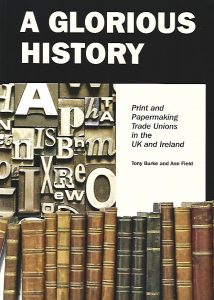 For the first time the story of print and paper workers’ struggle for rights and trade union freedoms is brought together in one illustrated volume. From the resources of the Printworkers’ Collection at the Marx Memorial Library and Workers’ School, the 72-page book brings together the experiences and exploits of print and paper worker agitation spanning 250 years.
For the first time the story of print and paper workers’ struggle for rights and trade union freedoms is brought together in one illustrated volume. From the resources of the Printworkers’ Collection at the Marx Memorial Library and Workers’ School, the 72-page book brings together the experiences and exploits of print and paper worker agitation spanning 250 years.
An introductory overview leads the reader to chapters on specific issues and trade union organisation showing how, in co-operation and sometimes in competition, trade unionists fought against poverty, injustice and exploitation. Graphic events are described from the days of imprisonment and transportation of the early trade unionists through to the major struggles for better conditions and later against attacks on jobs and recognition.
Most of the material for this booklet has been gathered from histories that were written after many of the most essential of workers’ trade union rights and collective liberties had been won: immunity from prosecution for strike action, picketing rights, ability to protect 100% membership (the closed shop). Struggles for basic rights were referred to as history, not battles yet to be fought. Twentieth century establishment of negotiating processes with employers and agreed referral to government-approved conciliation mechanisms including government ministers are in stark contrast to the contempt for trade unions and workers’ rights by employers and Government today.
Copyrights
This history is copyrighted and permission to reproduce in part or in whole must be given in writing. Reproduction must always include clear reference to the origin of the text in the Printworkers’ Collection at the Marx Memorial Library, 37a Clerkenwell Green, London, EC1R 0DU where archives of the print unions are on permanent display, and to authors where quoted.
All images were selected from material held in the Printworkers’ Collection of the Marx Memorial Library and permission must be sought for reproduction. Copyright of certain photographs as listed in the credits section of the booklet resides with their creators.
Authors Tony Burke and Ann Field are retired senior national officials of Unite and formerly of the Graphical Paper & Media Union.
For a copy of ‘A Glorious History’ email: Debra.Belle@unitetheunion.org
Please Note: Do not request multiple copies. This is limited edition book and only single copies will be provided. Copies will be sent out only at the discretion of the authors.
For further information or interviews please email tonyburke@mac.com or Ann.field@btinternet.com
A Glorious History: How print and papermaking unions were Britain’s labour movement pioneers
GCHQ & Trade Union Rights Campaigner Mike Grindley – A Humble Hero.
By Hugh Lanning
Many seek prominence, others have it thrust upon them. Mike Grindley, who died aged 85 in hospital on New Year’s Day following a stroke, was definitely one of the latter.
Humble and kind, Mike had been beavering away as a Chinese Linguist in the still very secret GCHQ since 1961 when, in January 1984, a rampant Margaret Thatcher sought to ban trade unions saying it was “a conflict of loyalties” to be a member of a trade union and work for GCHQ.
On 25th January 1984 all staff were given an ultimatum of leaving the union or face the sack. The public and political response to the announcement was massive with the TUC calling a day of action and even the right-wing led electricians union – EETPU, threatening to go on strike if there were sackings.
Despite the unions giving commitments to protect national security and a High Court ruling in the unions’ favour, Thatcher was not for turning and the ban was implemented on 1st March – with the House of Lords overturning the High Court decision on grounds of ‘national security’.
In the ensuing campaign, Mike became Chair of GCHQ Trade Unions representing union members from a small office in Cheltenham. Following its election victory in 1987, the Tory government were confident enough to proceed with its long-threatened sackings of the remaining trade unionists. These began on 14th November 1988 and 14 trade unionists, including Mike, were sacked in the end.
For Mike it was a moral issue – at a rally in London’s Central Hall held in protest at the sackings Mike let loose his feelings: “We resent utterly and completely the accusations that the trade unions we are proud to belong to are any threat to national security …. The traitors come from the old-boy network or elsewhere. No government has the right to say its employees that your democratic rights have been removed.” *
Over the next decade Mike became the symbol of the campaign speaking at trade union conferences, Tolpuddle and the annual January rallies in Cheltenham. He became famous – not least for the ever-faithful GCHQ Trade Unions carrier bag he had with him on all occasions and, to cheers, held up when he finished speaking. Not only did he promote the GCHQ cause, but he also took solidarity to other workers in dispute – to Wapping, Silent Night, P&O and many others. Proud of his Irish heritage established and kept strong links with many Irish trade unions.
The GCHQ dispute is still highly relevant today. It was clear the Tory Government was intent on banning unions not only in GCHQ but in other areas of government and limiting rights to strike in ‘essential services’. The response and the difficulty in implementing the ban in GCHQ effectively blocked the avalanche of union attacks envisaged the Tories. This was done through the enduring commitment of the sacked workers supported by the civil service unions and the collective and united response of the wider trade union movement here and abroad.
Wherever Thatcher went across the international stage she was hounded about GCHQ and her hypocrisy in criticising other Governments on ‘human rights’. The campaign is a valuable lesson and example for trade unionists of today facing similar threats in the wake of the growing number of industrial disputes.
His proudest moment came in August 1997 when Robin Cook honoured an oft-repeated Labour pledge to restore trade unions in GCHQ. Marching, fist clenched with his GCHQ Trade Union plastic bag in hand – he led the sacked unionists back through the gates into GCHQ. This success came about in no small part due to Mike’s willingness to make a life changing commitment to campaigning for what he believed in – the right to belong to a union.
Mike remained the custodian of the campaign and was planning how the 40th Anniversary of the ban should be marked in 2024 – keen that an important trade union victory should be properly remembered. He is survived by the three children of the marriage to his beloved Isabel – Helen, Tim and Neil and his sister “Biff”.
Mike Grindley 5th August 1937 – 1st January.
*[A Conflict of Loyalties – GCHQ 1984-1991. Hugh Lanning and Richard Norton-Taylor. New Clarion Press.]
This obituary first appeared in the Morning Star and was sent to me by Hugh Lanning.
Venezuela Solidarity Campaign AGM
 The VSC AGM took place on line on October 8th. Here is my welcoming speech as Chair of VSC.
The VSC AGM took place on line on October 8th. Here is my welcoming speech as Chair of VSC.
Welcome all to this 2022 Annual General Meeting and its pleasure to be the opening speaker for the Venezuela Solidarity Campaign at this event today.
We are holding this event at a critical stage for Latin America and Venezuela, with developments in Brazil in particular on everyone’s mind.
We all hope that Lula wins the second round ballot for the sake of the Brazilian people and progressives worldwide.
In terms of today’s agenda, it’s been seven years or so since the United States first imposed sanctions on Venezuela, absurdly declaring Venezuela “an unusual and extraordinary threat to the national security and foreign policy of the United States”.
Under Trump those sanctions – which are illegal under international law – were ratcheted up to become a blockade of the sort that Cuba has endured for decades.
The impact has been devastating. A UN report last year described how these sanctions have completely debilitated the Venezuelan economy, massively degrading peoples’ living standards.
On top of that, Venezuela has had to deal with the pandemic while the US sanctions have severely restricted its ability to buy the full range of necessary medical supplies.
If sanctions like these are inhumane all the time, during the years of the pandemic the have been nothing short of criminal.
But while Venezuela is emerging from the pandemic with signs of economic recovery, US sanctions are still a major concern.
There was perhaps a sliver of hope that when Biden took office there might be some relaxation of the blockade. But Biden dashed that hope initially by renewing the declaration of a state of national emergency regarding Venezuela. Whilst some minor relaxations have taken place, the bulk of these illegal sanctions remain in place.
In the VSC we are clear that dialogue and peace are the way forward, not sanctions and aggression.
Here in the UK we also need to keep talking about the ownership of Venezuela’s gold, held by the Bank of England, that rightfully belongs to the Bank of Venezuela and the Venezuelan people.
This is still an issue that VSC needs to keep campaigning on.
To conclude, the overarching issue that we need to carry on campaigning on is the sanctions imposed by the US, with support from the British government, Canada and the EU.
This means raising it in our union branches and regional bodies and other organisations. Those comrades who are on line should raise the question of affiliation of their union, their region and branch to build solidarity with the Venezuelan people.
We need to continue seeking support for our petition and explain why sanctions are unjust, illegal and so harmful to the Venezuelan people, especially the poorest and most vulnerable
Our solidarity is an important source of strength and comfort to the Venezuelan people – thanks to everyone for attending today.
Solidarity, Viva Venezuela, Viva Lula.
The Australian Jobs and Skills Summit – a union view
 By Andrew Dettmar, President of the Australian Manufacturing Workers Union
By Andrew Dettmar, President of the Australian Manufacturing Workers Union
The national employment and skills summit which took place in Canberra on 1/ 2 September, was a triumph of participation and leadership for new Labor Prime Minister Anthony Albanese. And it was an overwhelmingly positive experience for trade unions – but there is still a way to go.
A tradition has grown up on the part of newly elected ALP governments to hold a Summit soon after election. This reversesthe practice of Liberal/ National Party governments whose stock-in-trade has been their denial of social dialogue. In the end, under Scott Morrison even business leaders were having difficulty being heard, thanks to his peculiar mode of leadership, which as we now know involved him being the (secret) actual minister in 5 portfolios other than his own.
The original 1983 Summit set up trade unions as a key part of political decision-making for the next 13 years of the Labor Government. It reinforced the success of the Bob Hawke model of “consensus” and effectively launched the ACTU/ ALP Accord. Very few women were present at the 1983 summit. While this was noted at the time, there was also a marked paucity of representation from many others: first nations, disability activists, welfare recipients, rural and regional Australia, environmental activists, etc. Participation of representatives of these groups was a hallmark of the 2022 meeting.
To the extent that such a nominated group of unions, businesses and social groups can be seen as representative, the summit represented a very broad cross-section of Australian society. The only body unrepresented was the Liberal Party. While he was invited, Peter Dutton and his team of rejects decided that the best way to mouth any criticisms they had was from outside. After the fact, they complained that they would not want to be associated with “union thugs”. The more things change, etc.
Anthony Albanese successfully set the scene, and his various ministers, led by Treasurer Jim Chalmers, showed significant unity of purpose in the policies that they are taking into government. For those trade unions present – effectively the entirety of the Australian Council of Trade Unions executive – the exercise was well worth it.
The main focus of trade unions in the lead up to the summit was the creation of fairer and more equitable labour laws, but union views on industry policy, training and education, trade, defence, immigration, climate, were also in the mix.
This was reflected in the many “roundtables” set up to feed ideas to the main meeting.
Since the days of the WorkChoices laws under John Howard in 2004, unions’ ability to bargain has been severely ircumscribed. While the worst of WorkChoices was ameliorated by the Fair Work Act in 2009, after the election of the Rudd/Gillard Labour governments in 2007, the basic limitations of WorkChoices remained. This effectively put a stop to any notion of industry level bargaining; on the contrary it opened the way to bargaining processes where companies, especially large ones like Qantas, were able to particularise and individualise employment arrangements in their business operations to the point where people working alongside each other operate on completely different and separate wages and conditions. It also led the way to less and less secure employment – many suffering from the equivalent of the UK’s “zero hours” contracts.
One of the early keynote speeches on the Thursday was that of Tony Burke the Industrial Relations minister, who stated that following consultation there would be a restoration of bargaining rights to unions to be able to bargain across companies, at an industry level. There would also be significant removal of barriers to bargaining. Currently employers have been able to go around and behind trade unions by refusing to negotiate. Where bargaining has not been successful, they can then threaten and in some cases apply to cancel existing agreements, as a way of upping the ante in negotiations. A perfect illustration of this was provided during the Summit; New South Wales Premier Dominic Perrottet decided to escalate his long-running dispute with the rail unions by threatening the cancellation of their existing agreement. This has now blown up in his face after the RTBU called his bluff; his brinkmanship has been rewarded by a significant loss of popularity, and he is likely to be trashed at the polls in early 2023.
Another focus of the summit was the issue of skilled migration.
Skilled migration used to be a part of Australia’s consensus-based politics. Our status as a settler nation has been anchored in being able to attract significant migration from other countries, in particular skilled migration. After World War II Australia’s European migrant population was almost totally white Anglo-Celtic, on Aboriginal and Torres Strait Islander land. This was changed by the mass immigration policies implemented by the Chifley Labour government and continued under successive Liberal governments beginning with Menzies. This consensus remained up until the election of John Howard in 1996. Howard had an unfortunate tendency to kick the racist can whenever he had the opportunity, infamously alienating many Australians and especially those of Asian origin by suggesting a “slowing down“ of Asian migration, in particular Chinese migration, in the 1980s.
Howard’s attacks on Asian migration enabled the rise of Pauline Hanson in the 1996 election when Labor was ejected from Office. While Hansen may have been dis-endorsed by the Liberals, she still won, and has managed to parlay that into a 25 year career representing the extreme right, and racist and assimilationist policies. Howard‘s worst efforts as prime minister occurred in the early 2000s. When his WorkChoices legislation was passed he also decided to introduce and accelerate temporary skilled migration visas, without any significant controls or limits. While these visa workers were supposed to address skill shortages, their employment masked the under payment and significant exploitation of many Australian workers who would refuse to work for the low wage, insecure jobs on offer.
Again, while this situation was ameliorated under the Rudd and Gillard governments, the temporary skilled migration rort continued. Under the Liberal/ National Party governments of Abbott/ Turnbull/ Morrison, any notion of Govt control of skilled migration became a farce; employers and migration agents ignored any notion of fair dealing, leading to massive exploitation and in some cases abuse of vulnerable workers. Their interest was less in assisting people to get a new and productive life in Australia and more in making millions from the misery of others. Unfortunately for Morrison, the pandemic closed borders and halted temporary migration in its tracks.
The new Labor government at the Summit emphasised the importance of permanent skilled migration. It was noted that, if there is a need for temporary skilled migrants, they must be paid a fair wage (and have the benefit of union protection) and notused as industrial cannon fodder to suppress wages.
The summit showed that such a policy is not only possible but can be implemented. Unions in particular will be watching with interest, while participating in setting up consultation and control measures. We need to ensure that temporary skilledmigration only occurs in an area of actual need and the workers who come to our country on this basis are not exploited and are given the same protections as Australian workers.
Another major announcement was PM Albanese’s announcement of funding for 180,000 vocational training places through government-funded TAFE colleges, and developing new ways of looking at technology and skill formation. Part of this is restoring workers’ voice to vocational training arrangements.There was also a new focus on climate, energy and environment.In a complete reversal of the climate change denialism of the previous Liberal/ National Party administrations, Labor is serious about environmental sustainability. The 43% reduction in emissions by 2030 is a good start, but much more needs to be done.
There will be many who invest significant and perhaps unfounded hope in the Summit and its outcomes. It will of course be used by the Labor Party in government as a way of ensuring that the issues that they raise and prosecute through the parliament have been subject to consideration by a broad cross-section of Australian society. in this Albanese he is somewhat similar to Hawke, who prided himself on consensus. While consensus grammatically requires the giving of consent, at no time could it be said that everybody consents to the changes. This form of “manufactured” consent, is classic social democracy. There is an important point to be made however from the Hawke and Accord years which is not present at this point in time. Hawke came to power after a significant period of Conservative government under Malcolm Fraser. Australia’s balance of payments was shot, we were suffering from a major drought in the eastern states, there was over 1 million unemployed out of the workforce of less than 10 million, and there were major problems in the sustainability of Australian industry.
Unions decided in the 1980s that the way forward was to try and reach agreement with Labor, and to develop a structural way of dealing with policy. The resulting ACTU/ALP Accord was a unique document in Australian history. Whilst it more than ran its course (for instance in 1995 I was involved in the negotiation of Accord Mark VIII, never implemented due to Labor’s fall) it was a process which in its early years particularly was productive and resulted in significant reforms in industry development, industrial relations, skills and training, education and others. Not all were positive. There is a small industry in Australia dedicated to denigrating the Accord, much of which simply reproduces Trotskyite criticisms from the early 1980s. Whilst it became an excuse for inaction by some in Labor and trade unions in the 1990s, it was nevertheless a vital and dynamic process in the 80s. And a lot of hard work.
We do not have an accord this time around, nor is one in prospect. I am hopeful that the development of policies which we have been instrumental in creating through this new government, and a very comprehensive process of labour policy development done in concert with trade unions as social partners, will lead to a new way of doing business.
However the most profound change with the election of the Albanese government, and exemplified by the summit, is that this government is prepared to listen and to participate. Scott Morrison with his five ministries was fond of saying we are there to govern. In response to any criticism especially from his own side his favourite trope was “I am the Prime Minister”. The paucity of thought behind this approach to government led to the significant impoverishment of Australian political life. Whilst I make jokes about employers finding our telephone numbers after nine years, many union officials are dealing with employers who make similar points: they did not even talk to them, their natural constituency. Government under Scott Morrison was not interested in anything but it’s own very narrow agenda to retain power.
There is a long way to go of course with Labor, but this makes for a very good start.
By failing to stand with working people, Labour is taking an electorally risky stance
By Simon Fletcher
Keir Starmer’s backtracking on nationalisation looks like an excess of caution, when he should be boldly reaping the benefits of Tory disarray.
Last week was a watershed for Keir Starmer’s Labour, laying bare the limitations of Labour’s project as it stands. The party aimed to start the week with a set-piece speech on economic growth. Instead, it succeeded in turning it into rows with itself – over dropping public ownership of the big utilities, its stance on the wages crisis and its handling of strikes.
The sacking of the shadow transport minister, Sam Tarry, symbolised many of these difficulties. The leader’s office says it had no choice, after an unauthorised media round, breaking collective responsibility. But it was also reported that he was sacked for saying that it was “not acceptable to offer below inflation pay rises” because it would be a real-terms wages cut for workers.
It’s a raw nerve: cost of living pressures are ripping through British society, with the biggest collapse in living standards for decades. UK real pay levels look set to slump by 6% in the next two years, the worst fall in the G7. Millions are being forced to accept worse pay and working conditions. Measures such as fire and rehire and legalising agency work for strike-breaking hang over them. Consequently, trade unions are being placed in the centre of the argument.
In the midst of this, the Labour leadership’s problem is that it gives every impression of being more obsessed with differentiating itself from the previous leader than it is with the millions of people getting hit through their pay and energy bills.
Starmer gave clear commitments when he stood for leader in favour of public ownership. Binning those policies last Monday caused anger across the party and further strained Labour’s relationship with the unions. But it’s also about the process – dripped out in response to media questions. The Labour leader tried to clarify that he had not in fact changed Labour’s position on public ownership for the railways, though his clarification itself left many confused. An excess of caution leaves big issues unresolved, lying around like unexploded ordnance, only to go off at the wrong time. As a portent of how Labour would govern, it suggests an administration prone to be buffeted about by events.
Public ownership of the energy companies would place Labour on the side of those who are struggling badly
The stated reason for Starmer’s broken commitment to public ownership – the pandemic has changed things – is wrong. Covid has actually strengthened the case for changes in ownership. The rail franchising system collapsed during lockdown and millions of pounds went straight into profits for the private rail companies.
Likewise, the public is living in dread over energy bills. Public ownership of the energy companies would place Labour on the side of those who are struggling badly. On the day Labour ditched the policy, the Trades Union Congress published a detailed report on how to make it happen.
We are asked to believe that Labour’s position on the utilities is pragmatic, not ideological. But if the outcome in almost every case is the maintenance of the failing status quo, the ideology is inescapable.
In truth, the Labour leader’s office does not seem to have a theory to fully explain the present situation in Britain, one that then aims to use all the policy levers to tackle the consequences of it. As one experienced Labour campaigner described it to me, “their mindset is benevolent managerialism”. Labour’s detachment is why it struggles to tell a persuasive story about what is happening to people and, therefore, “why Labour?”.
Ferocious infighting in the Tory party is tearing great holes in its credibility. Liz Truss and Rishi Sunak are definitely beatable, though it is far from a foregone conclusion. Labour cannot afford to waste the moment. By failing to stand with working people trying to defend their living standards, Labour is in danger of walling itself off from them. It is electorally dangerous.
With the Tories in meltdown, Labour can afford to shed some of its timidity and launch a stronger case that connects to the cost of living crisis – and it should.
First published on The Observer website on July 30th and republished with permission of the author.
Posted in Blogs, Employment Rights, Labour Party
Leave a comment
Turkey’s left wing HDP Party prepares for election
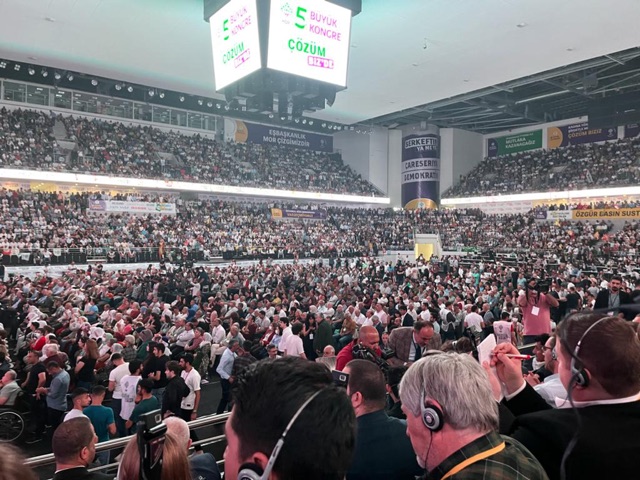 I attended what could be the last Congress of the left HDP Party (The Peoples’ Democratic Party) before the Turkish election next year with Labour MP Lloyd Russell Moyle.
I attended what could be the last Congress of the left HDP Party (The Peoples’ Democratic Party) before the Turkish election next year with Labour MP Lloyd Russell Moyle.
Founded in 2012 the HDP held its 5th Congress in a large indoor sports hall on July 3rd in Ankara – attended by an estimated 10,000 people (many of them young people) with over 100 international guests and representatives from the European Parliament’s Socialists and Democrats (S&D) Group. HDP is an associate member of Party of European Socialists (PES) and a consultative member of the Socialist International.
The HDP’s political focus is based on radical democracy, feminism, LGBT rights, youth rights and egalitarianism and since the 2015 elections in Turkey the right wing and ultra-nationalist AK party led by current president Tayyip Erdogan has launched on going attacks on the party attempting to close it down and seize its assets before the next election.
Over 5000 HDP activists and supporters including politicians, trade unionists, lawyers, journalists and HDP staff have been arrested or jailed.
Under Erdogan Turkey is facing big economic problems with inflation running at 78% and a majority of young Turkish people (12% of all voters who pollsters predict will be decisive in a very tight election race) say they want change to improve job opportunities, education, and free speech. Other key issues for them include justice, immigration and transparent economic policies.
The congress hall was decorated with banners that read “Democracy alliance will win”, “Free press cannot be silenced”, “Peace and resolution, not war and isolation”, “Not a monistic regime but a democratic republic”, “Democratic resolution of the Kurdish question” and “Not hunger and poverty – but equal distribution”.
The keynote speeches were given by HDP Co-Chairs Pervin Buldan and Mithat Sancar.
Pervin Buldan was clear that she anticipated HDP will be a power brokers in an expected coalition. “Upcoming elections will not be about selecting the president or prime minister. It will be about building a new democratic and egalitarian order in Turkey. The HDP is the main driving force behind these elections and the process going forward” she told delegates.
“We say there is another way. That way is the third way that HDP resolutely defends. And this is the democratic alliance that we will move forward with all the democratic forces and which we call Turkey’s democracy alliance. The will of the Kurdish people is in favour of co-existence, and through the democratic alliances it forms with the peoples it lives side by side.”
Mithat Sancar told delegates: “It frightens and worries them, the fact that we are the strongest alternative to their authoritarian regime. That’s why they attack us with all their strength. They think they’re going to destroy us. But they will never succeed. We warn the AKP government; do not play games on the isolation of Abdullah Öcalan, (imprisoned in isolation on an island for over 20 years) do not use such a sensitive issue for your power goals. Our stance on the presidential election is clear. We are open to negotiations and the idea of a joint candidate, in case of transparent negotiations in front of the public.”
For more information on the trade union campaign to free Abdullah Ocalan follow @ocalanfree and for information on the the HDP follow @HDP_Europe on twitter
Protest At Your Own Peril
By Adrian Weir
The odious current Home Secretary, Priti Patel, is widely despised and derided for her attempts to order the pushing back to sea of refugees and for presiding over the increase of the powers of the state over public protest with the introduction of the Police, Crime, Sentencing & Courts Act 2022 followed in short order by the Public Order Bill.
What Foot and Livingstone are able to demonstrate is that it was the apparently more genial Conservative Home Secretary in the early 1980s, Willie Whitelaw, who in fact set in train the shift in policing of public protest to a paramilitary style, learnt not in Belfast or Derry but from colonial policing in Hong Kong.
This new style was secretly published with very limited distribution as the Public Order Manual of Tactical Operations and Related Matters.
At this time – the advent of the neo-liberal era – the first of the Thatcher anti-union laws were introduced more or less straight away after the 1979 General Election in 1980, which were added to very considerably by a further Employment Act in 1982 by the notorious Norman Tebbit.
It was the creation of a plethora of civil wrongs that no union intent on winning a dispute could reasonably comply with, particularly limiting picketing to “at or near place of work,” coupled with the secret adoption of the new colonial style of policing that led to the NGA union (now part of Unite) being comprehensively beaten, in the courts and on the streets, in its dispute with Eddie Shah at the Stockport Messenger in 1983.
From that point forward the twin track approach of what could be called lawfare and warfare has put the unions in Britain mainly on the defensive with further demoralising defeats in the 1980s for the miners and, the print workers (again) at Wapping.
This was no accident, it clearly came about by design, as discussed in great detail in this book.
As used against the print workers and miners lawfare and warfare is a strategy to demobilise and debilitate organised labour which may have been expected to be in the vanguard of resistance to neo-liberalism.
In the 1980s this new style policing was not only deployed in cases where labour represented a direct threat to capital – it was shockingly also used against a hippy convoy in 1985.
The hippies were intent on holding a free festival at Stonehenge; the police, acting at the behest of the Wiltshire county set and the farming lobby, were determined to prevent an assembly at the monument which they did with extreme violence.
Lifestyle as well as industrial politics was now considered fair game as rave culture was to discover in subsequent years.
As the 80s gave way to the 90s the police were using, refining and redefining the tactics set out in their secret protocol, for example, the Poll Tax disturbances in Trafalgar Square in 1990, the anti BNP demonstration in Welling in 1993 and, the anti Criminal Justice Bill protests in Hyde Park of 1994.
And so it goes on. New Labour in office in London and Edinburgh provided little comfort for protestors at the G8 summit at Gleneagles in 2005 and the protestors at the G20 summit in 2009.
The school students’ protests against tuition fees in 2010 and more recently the Black Lives Matter activists and women remembering Sarah Everard have all been subject to violent police tactics not even known about never mind endorsed by Parliament
Foot and Livingstone show without a shadow of doubt that the suppression of protest over the past 40 years is essentially a strategic choice made by the elite in the neo-liberal era.
The body responsible for implementing that strategic choice was Association of Chief Police Officers –
now known as National Police Chiefs’ Council – working hand in glove with Home Secretaries of whichever political stripe.
Should Labour ever win a future General Election what could we expect? With the right of the Party now in control, our experience of the Blair and Brown premierships may be our guide.
In the 1990s, Blair promised and delivered very modest reform of labour and trade union rights; crucially most of the anti-union laws of the Thatcher and Major period were left intact, including the restrictions on effective picketing.
Welcome though Labour’s Green Paper A New Deal for Working People is these proposals will not deal with this essential issue.
Nor did Blair seek to undo any of the draconian public order offences introduced under Thatcher and Major, in fact his Government increased them.
Veteran of those years, Shadow Home Secretary Yvette Cooper MP, in the debate surrounding Patel’s recent raft of legislation has of course highlighted misogyny in the police but continues to argue “I strongly believe in the British model of policing by consent, we should be proud of it.”
Foot and Livingstone more than clearly show that the idea of “policing by consent” has been a dead letter for the past 40 years.
The reality, particularly for workers in dispute and for many others as well, is one of the police secretly evolving into a paramilitary gendarmerie.
First published in the Morning Star 6th June 2022


